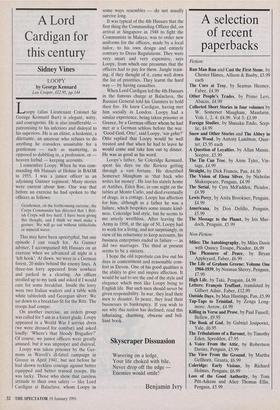A Lord Cardigan for this century
Sidney Vines
LOOPY by George Kennard
Leo Cooper, £12.95, pp.144
Loopy (alias Lieutenant Colonel Sir George Kennard Bart) is elegant, witty, and courageous. He is also insufferable patronising to his inferiors and disloyal to his superiors. He is an elitist, a hedonist, a dilettante, an amateur who refuses to do anything he considers unsuitable for a gentleman — such as mastering, as opposed to dabbling in, a profession, or heaven forbid — keeping accounts.
I remember Loopy. When he was com- manding 4th Hussars at Hohne in BAOR in 1955, I was a junior officer in an adjoining Gunner regiment. Many stories were current about him. One was that before an exercise he had spoken to the officers as follows:
Gentlemen, on the forthcoming exercise, the Corps Commander has directed that 1 Brit- ish Corps will live hard. I have been giving this thought, and I think we must make a gesture. We will go out without tablecloths or mineral water.
This may have been apocryphal, but one episode I can vouch for. As Gunner adviser, I accompanied 4th Hussars on an exercise when we advanced all night in a 'left hook'. At dawn, we were in a German forest, 20 miles behind the enemy lines. A three-ton lorry appeared from nowhere and parked in a clearing. An officer strolled up to my tank and asked if I would care for some breakfast. Inside the lorry were two Italian waiters and a table with white tablecloth and Georgian silver. We sat down to a breakfast fit for the Ritz. The troops had compo.
On another exercise, an orders group was called for 5 am in a forest glade. Loopy appeared in a World War I service dress (we were dressed for combat) and asked loudly: 'Where's that bloody Brigadier?' Of course, we junior officers were greatly amused, but it was improper and disloyal.
Loopy was taken prisoner by the Ger- mans in Wavell's ill-fated campaign in Greece in April 1941, but not before he had shown reckless courage against better equipped and better trained troops. He was lucky. Those who show that careless attitude to their own safety — like Lord Cardigan at Balaclava, whom Loopy in some ways resembles — do not usually survive long.
It was typical of the 4th Hussars that the first thing the Commanding Officer did, on arrival at Singapore in 1948 to fight the Communists in Malaya, was to order new uniforms for the officers, made by a local tailor, to his own design and entirely contrary to Dress Regulations. They were very smart and very expensive, says Loopy, from which one presumes that the officers had to pay for them. Jungle train- ing, if they thought of it, came well down the list of priorities. They learnt the hard way — by having casualties.
When Lord Cardigan led the 4th Hussars in the famous charge at Balaclava, the Russian General told his Gunners to hold their fire. He knew Cardigan, having met him socially in London. Loopy had a similar experience, being taken prisoner in Greece, by a German officer whom he had met at a German schloss before the war. `Good God, Otto', said Loopy, `wie gehts?' Otto replied that Loopy would be well treated and that when he had to leave he would come and take him out tq dinner. He was as good as his word.
Loopy's father, Sir Coleridge Kennard, spent his days on the Riviera getting through a vast fortune. He described Somerset Maugham as 'that hack who writes for money'. He lost his stately home at Antibes, Eilen Roc, in one night on the tables at Monte Carlo, and died eventually of drugs, in a cottage. Loopy has affection for him, although as a father he was a failure, which bespokes some innate kind- ness. Coleridge had style, but he seems to me utterly worthless. After leaving the Army in 1958, at the age of 50, Loopy had to work for a living, and not surprisingly, in view of his reluctance to keep accounts, his business enterprises ended in failure — as did two marriages. The third at present seems to be a success.
I hope the old reprobate can live out his days in contentment and reasonable com- fort in Devon. One of his good qualities is the ability to give and inspire affection. It would be sad to see the end of the style and elegance which men like Loopy bring to English life. But such men should never be given responsibility. In war, they lead their men to disaster. In peace, they lead their businesses to bankruptcy. If you wish to see why this nation has declined, read this infuriating, charming, obscene and bril- liant book.


















































 Previous page
Previous page